人教版九年级上册英语笔记
人教版九年级英语单元笔记梳理
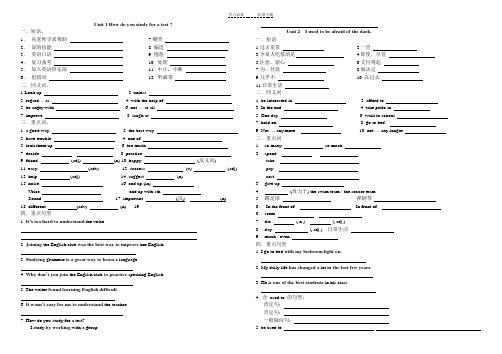
学习必备欢迎下载Unit 1 How do you study for a test ?一.短语。
1.向老师寻求帮助7.嘲笑2.说的技能8 .编造3.英语口语9 .抱怨4.复习备考10. 处理5.加入英语俱乐部11. 中止,中断6.犯错误12. 听磁带二.同义词。
1 Look up 2. unless3. regard… as4. with the help of5. be angry with6. not … at all7. improve 8. laugh at三.重点词。
1. a good way2. the best way3. have trouble4. one of5. look them up6. too much7. decide 8. practice9. friend (adj) (n) 10. happy (反义词)11. easy (adv) 12. success (v) (adj) 13. help (adj) 14. suggest (n)15. noise 16. end up (in)Voice end up with sthSound 17. important (反) (n) 18. different (adv) (n) 19.四.重点句型1. It’s too hard to understand the voice.2. Joining the English club was the best way to improve her English.3. Studying grammar is a great way to learn a language.4. Why don’t you join the English club to practice speaking English.5. The writer found learning English difficult.6. It wasn’t easy for me to understand the teacher.7. How do you study for a test?-- I study by working with a group..Unit 2 I used to be afraid of the dark.一.短语1过去常常2一直3令某人吃惊的是4即使,尽管5注意,留心6支付得起7为…付款8做决定9几乎不10 在过去11日常生活二.同义词1. be interested in2. afford to3. In the end4. take pride in5. One day6. walk to school7. hold on8. go to bed9. Not … any more 10. not … any longer 三.重点词1.so many so much2.spendtakepaycost3.give up4.(效力于) the swim team / the soccer team.5.踢足球弹钢琴6.In the front of In front of6.seem7.die ( n ) ( adj )8.day ( adj ) 日常生活9.much / even四.重点句型1. I go to bed with my bedroom light on.2. My daily life has changed a lot in the last few years.3. He is one of the best students in his class.4. 含used to 的句型:肯定句:否定句:一般疑问句:5. be used to学习必备欢迎下载used to6 with the door / window With the lightUnit3 Teenagers should be allowed to choose their own clothes. 一短语1 打…的耳动2 代替,而不是3 在校期间的晚上4 打扫5 到达6 对…严格要求7 集中精力于8 两个…都9 目前10 有机会做11 养老院12 驾照13 同意sb 14 不同意sb16 担心17 实现sb 的梦想18 做决定19 关注20 职业运动员21 答复22 至少23 …的重要性二同义词1 achieve one’s dream2 get to3 go back / come back4 give back三重点词1 stop2 seem3 need4 noise (adj)5 like (prep)6 sleep (adj)7 other8 others 9 another10 the other 11 sixteen –year –old12 realize sixteen—year—olds13 succeed (n) (adj) (adv)14 own (v) (adj)15 too either also16 Saturday afternoon 17 be strict sb18 stay up 19 would like20 be strict sb be strict sth四重点句型1. 含情态动词的被动语态;肯定句:否定句:疑问句:2mustcan’tcould / mightmay3Teenagers should be allowed to choose their own clothes..4I think students should be allowed to do homework with friends.--I disagree. They talk instead of doing homework.5I don’t think sixteen-year-olds should be allowed to drive.--I agree. They aren’t serious enough.6 Longer vacation would give us time to do things like volunteering.7 Last summer I had an opportunity to volunteer at the local hospital.8 Everyone need to have at least eight hours’sleep a night.Unit 4 What would you do if you had a million dollars? 一.短语1 医疗机构2 穿衬衫打领带3 如果…该怎么办4 太…而不能5 害怕6 当众,公开地7 变得紧张8 几乎不9 在…的前面10 未经允许11 感冒12 征求某人的允许13 下次14 介绍自己15 足够多的16 和…相处17 而不是18 立刻,马上19英语演讲比赛20 名列前茅21 急救22 出版,发行23 偶然地,意外地24 事实上25 把sth 藏起来以免让sb看见二.同义词1.Let sb down 2 right away3 get along with4 not… in the slightest三.重点词1. would rather than .=2 energy (adj) create (adj) confidence (adj ) friend (adj )学习必备欢迎下载3 before after4 knowledge (adj )5 advice (n) suggest (n) 四.重点句型。
九年级上册英语第一单元笔记
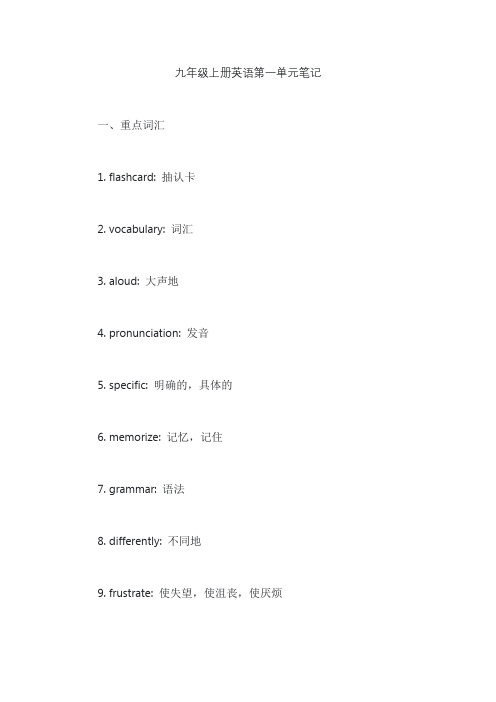
九年级上册英语第一单元笔记一、重点词汇1. flashcard: 抽认卡2. vocabulary: 词汇3. aloud: 大声地4. pronunciation: 发音5. specific: 明确的,具体的6. memorize: 记忆,记住7. grammar: 语法8. differently: 不同地9. frustrate: 使失望,使沮丧,使厌烦10. quickly: 快地,迅速地二、重点短语1. ask for help: 寻求帮助2. study for a test: 为考试而学习3. work with friends: 和朋友一起学习4. listen to tapes: 听磁带5. read aloud: 朗读6. make flashcards: 制作抽认卡7. practice pronunciation: 练习发音8. watch English movies: 看英语电影9. join the English club: 加入英语俱乐部10. have conversations with: 与……交谈三、重点句型1. How do you study for a test? 你怎样为考试做准备?2. I study by working with a group. 我通过和小组一起学习。
3. What about listening to tapes? 听磁带怎么样?4. It’s too hard to understand the voices. 听懂那些声音太难了。
5. Have you ever studied with a group? 你曾经参加过学习小组吗?6. I’ve learned a lot that way. 通过那种方式我已经学到了很多。
7. It improves my speaking skills. 它提高了我的口语技能。
四、重点语法1. 介词by 的用法- 表示方式、方法,意为“通过;靠;用;凭借”,后接名词或动名词。
人教版九年级英语课堂笔记
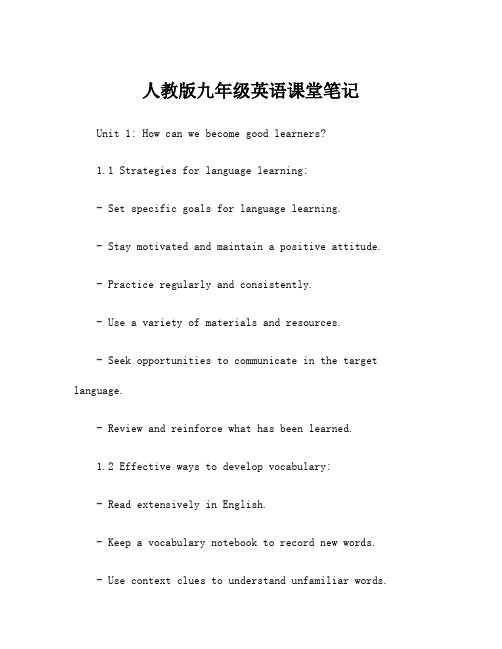
人教版九年级英语课堂笔记Unit 1: How can we become good learners?1.1 Strategies for language learning:- Set specific goals for language learning.- Stay motivated and maintain a positive attitude.- Practice regularly and consistently.- Use a variety of materials and resources.- Seek opportunities to communicate in the target language.- Review and reinforce what has been learned.1.2 Effective ways to develop vocabulary:- Read extensively in English.- Keep a vocabulary notebook to record new words.- Use context clues to understand unfamiliar words.- Use flashcards or online tools for vocabulary practice.- Review and revise vocabulary regularly.- Apply learned words in speaking and writing.1.3 Skills for reading comprehension:- Skim the text to get a general idea.- Scan for specific information.- Pay attention to headings, subheadings, and formatting.- Look for context clues to understand unfamiliar words.- Make predictions and infer meaning from context.- Summarize the main points of the text.1.4 Strategies for listening comprehension:- Pay attention to the speaker's body language and facial expressions.- Focus on keywords and phrases.- Take notes while listening.- Ask questions for clarification.- Practice listening to a variety of accents and speech speeds.- Listen to authentic materials, such as podcasts or videos.1.5 Techniques for effective note-taking:- Use abbreviations and symbols to save time.- Write down key information and main ideas.- Organize information using headings and subheadings.- Use diagrams or mind maps to visualize information.- Review and revise notes after the lecture or class.- Highlight important points or concepts.1.6 Strategies for overcoming difficulties:- Seek help from teachers or classmates when facing challenges.- Break tasks into smaller, manageable parts.- Develop a growth mindset and believe in one's potential.- Practice self-reflection and learn from mistakes.- Find strategies or techniques that work best for individual learning styles.- Stay persistent and persevere through difficult times.Unit 2: Why don't you get her a ticket to the concert?2.1 Making suggestions and offers:- Why don't you...?- How about...?- I suggest...- Would you like me to...?- Do you want...?- Let's...2.2 Expressing preferences:- I prefer...- I'd rather...- I'm more interested in...- I'm not really into...- I'd love to...- I'm not keen on...2.3 Giving and asking for advice: - You should...- It would be a good idea to... - Have you thought about...?- What do you recommend?- What's your opinion on...?- Can you give me any advice on...?2.4 Responding to advice and suggestions:- That's a great idea!- I'll definitely consider it.- I'm not sure about that.- I don't think it's a good option.- Thanks for the suggestion, but I think I'll pass. - I'll think it over and let you know.2.5 Talking about possible outcomes:- If you go to the concert, you'll have a great time. - If you study hard, you'll get good grades.- If it rains, we'll have to stay indoors.- If she misses the bus, she'll be late for school. - If we leave now, we'll catch the train.- If you don't hurry, you'll miss the deadline.2.6 Offering alternatives:- Instead of going to the movie, we could go bowling.- If you don't like pizza, we can order Chinese food.- Rather than taking the bus, you could ride your bike.- If she can't attend the party, we'll invite someone else.- In case of bad weather, we can have the picnic indoors.- If the store is closed, we'll try another one.。
人教版九年级上册英语笔记

⼈教版九年级上册英语笔记九年级上册英语讲义【unit3-unit7】(绝密资料)Unit3【短语归纳】1.getsomemagazines得到⼀些杂志2.beafraidof害怕3.Fromtimetotime时常;有时4.turnred变红5.takeup开始做25.getto35.onone’sleft/right在某⼈的左/右边36.goalongMainStreet沿着主⼤街⾛37.havedinner吃饭38.gotothethirdfloor去三楼39.aroomforresting休息室40.bespecialabout...有……独特之处41.pardonme请再说⼀次/doc/4506b0aaeffdc8d376eeaeaad1f34693daef1092.html eon过来;加油43.on eone’swayto...在去.......的路上43.somethingtoeat⼀些吃的东西44.holdone’shand抓住某⼈的⼿45.mail(send)aletter寄信46.passby路过47.arockband摇滚乐队48.intheshoppingcenter在购物中⼼49.insomesituations在某些场合50.parkone’scar停车51.anundergroundparkinglot地下停车库52.thanksb.fordoingsth.为…感谢某⼈礼貌的n】v】指路【v】1.-Excuseme,couldyoupleasetellmehowtogettothebo okstore?B:-Sure,justgoalongMainStreetuntilyoupassCe nterStreet.Thebookstoreisonyourright,nexttoth ebank.打扰⼀下,你能告诉我怎样到达书店吗?当然,就沿着主街⾛,⼀直到你经过中⼼⼤街。
人教版九年级英语上册各单元知识点梳理
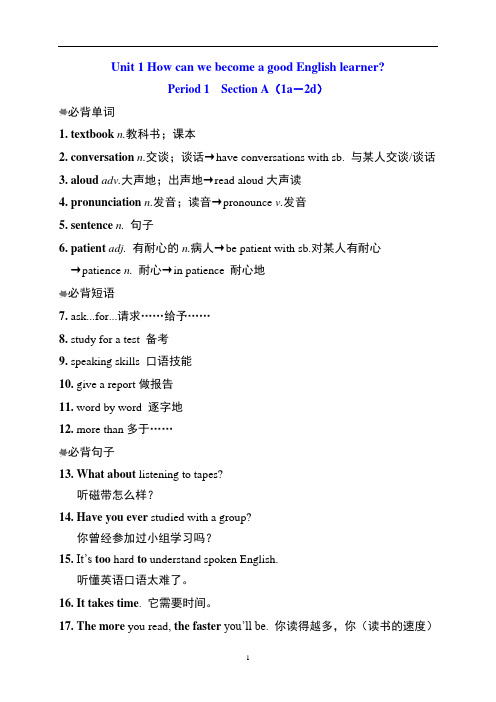
Unit 1 How can we become a good English learner?Period 1 Section A(1a-2d)必背单词1.textbook n.教科书;课本2.conversation n.交谈;谈话→have conversations with sb. 与某人交谈/谈话3.aloud adv.大声地;出声地→read aloud大声读4.pronunciation n.发音;读音→pronounce v.发音5.sentence n. 句子6.patient adj. 有耐心的n.病人→be patient with sb.对某人有耐心→patience n. 耐心→in patience 耐心地必背短语7. ask...for...请求……给予……8. study for a test 备考9. speaking skills 口语技能10. give a report做报告11. word by word 逐字地12. more than多于……必背句子13. What about listening to tapes?听磁带怎么样?14.Have you ever studied with a group?你曾经参加过小组学习吗?15.It’s too hard to understand spoken English.听懂英语口语太难了。
16. It takes time. 它需要时间。
17.The more you read, the faster you’ll be.你读得越多,你(读书的速度)就会越快。
Period 2 Section A(3a-3b)必背单词1. expression n.表情;表示;表达方式→express v.表达;表露→adj. 特快的→an express train 特快列车2.discover v. 发现;发觉→discovery n.发现→discoverer n. 发现者3.secret n.秘密;秘诀→keep a secret保守秘密→the secret to/of success成功的秘密→secret adj.秘密的;保密的→secret news 秘闻4. grammar n.语法必背短语5. be afraid to do sth.不敢做某事→be afraid of doing sth.害怕做某事6. because of 因为7. fall in love with 爱上……8. look up (在词典或参考书中)查阅;抬头看→look it /them up查阅它/它们→look up to sb.仰慕某人=admire sb.必背句子9. The teacher spoke so quickly that I did not understand her most of the tim老师说得太快,以至于很多时候我都听不懂她(说的话)。
人教版九年级英语上册各单元知识点归纳总结
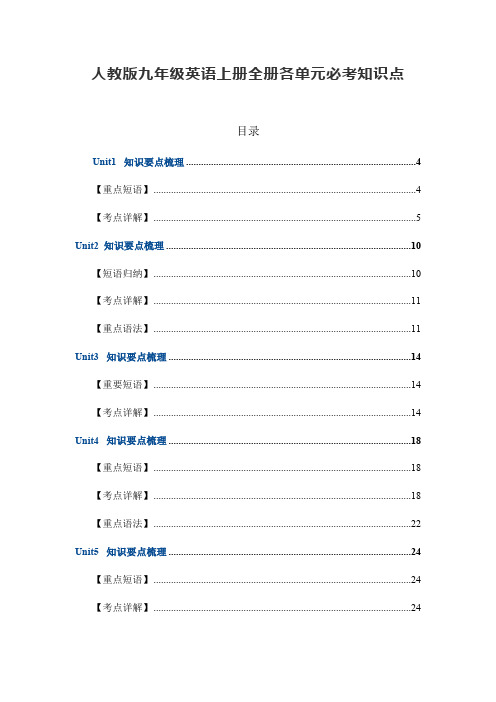
人教版九年级英语上册全册各单元必考知识点目录Unit1 知识要点梳理 (4)【重点短语】 (4)【考点详解】 (5)Unit2 知识要点梳理 (10)【短语归纳】 (10)【考点详解】 (11)【重点语法】 (11)Unit3 知识要点梳理 (14)【重要短语】 (14)【考点详解】 (14)Unit4 知识要点梳理 (18)【重点短语】 (18)【考点详解】 (18)【重点语法】 (22)Unit5 知识要点梳理 (24)【重点短语】 (24)【考点详解】 (24)【重点语法】 (27)Unit6 知识要点梳理 (30)【重点短语】 (30)【考点详解】 (30)【重点语法】 (33)Unit1 知识要点梳理【重点短语】1. have conversation with sb. 同某人谈话2. too…to… 太……而不能3. the secret to… ……的秘诀4. be afraid of doing sth./ be afraid to do sth. 害怕做某事5. look up 查阅6. repeat out loud 大声跟读7. make mistakes in 在……方面犯错误8. connect ……with… 把……和……连接/联系起来9. get bored 感到厌烦10. be stressed out 焦虑不安的11. pay attention to 注意;关注12. depend on 取决于;依靠13. the ability to do sth.. 做某事的能力【考点详解】1. by + doing 通过……方式(by是介词,后面要跟动名词,也就是动词的ing 形式)2. talk about 谈论,议论,讨论The students often talk about movie after class. 学生们常常在课后讨论电影。
talk to sb= talk with sb 与某人说话3. 提建议的句子:①What/ how about +doing sth.? 做…怎么样?(about后面要用动词的ing形式,这一点考试考的比较多)如:What/ How about going shopping?②Why don't you + do sth.? 你为什么不做…?如:Why don't you go shopping?③Why not + do sth. ? 为什么不做…?如:Why not go shopping?④Let's + do sth. 让我们做…...吧。
人教版九年级上册英语笔记
人教版九年级上册英语笔记(总22页)-CAL-FENGHAI.-(YICAI)-Company One1-CAL-本页仅作为文档封面,使用请直接删除九年级上册英语讲义【unit3-unit7】(绝密资料)Unit3【短语归纳】1. get some magazines得到一些杂志2. be afraid of 害怕3. From time to time 时常;有时4. turn red 变红5. take up 开始做6. deal with 对付;应付7. not…anymore 不再8. tons of attention 很多关注9. worry about 担心10. be careful 当心11. a very small number of… 极少数的……12. a pair of 一对;一双;一副13. walk up to走上前;朝……走去14. a little earlier早点儿15. be alone 独处16. give a speech 做演讲17. in public 当众18. all the time 一直;总是19. on the soccer team 在足球队20. be proud of… 为……骄傲forward to盼望;期待lot 停车场23. make a decision 做决定25. get to到达26. change one’s life 改变某人生活27. even though 尽管28. take care of 照顾33. in the last few years 在过去的几年里34. turn left/right 向左/右转35. on one’s left/right 在某人的左/右边36. go along Main Street 沿着主大街走37. have dinner 吃饭to the third floor 去三楼39. a room for resting 休息室40. be special about.. .有……独特之处41. pardon me 请再说一次42. come on 过来;加油43. one one’ s way to... 在去.......的路上43. something to eat一些吃的东西44. hold one’ s hand 抓住某人的手45. mail(send) a letter 寄信46. pass by 路过47. a rock band 摇滚乐队48. in the shopping center 在购物中心49. in some situations 在某些场合50. park one’ s car 停车51. an underground parking lot地下停车库52. thank sb. for doing sth. 为…感谢某人53. look forward to…期盼…54. meet sb. for the first time 第一次见到某人55. in a rush to do sth. 仓促地做某事56. be convenient to do sth. 做某事很方便to in引入;导入the door在门口的【单词变形】1.expensive →inexpensive 不贵的2. crowded →uncrowded 不拥挤的3. politely→polite→impolite没有礼貌的adv→adj→反义4.I talian→Italy n→n 意大利人/的→意大利5,。
Unit10笔记人教版英语九年级全册
Unit 10 知识梳理总结【词汇梳理】greet(v.和......打招呼;迎接)→ greeting (n. )relax(v.放松;休息)→ relaxed (adj. 放松的;自在的)→ relaxing (adj. 令人放松的)value(n.价值)→valuable(adj.贵重的;宝贵的)→ be of great value很有价值north(n.北;北方;adv.朝北;向北)→northern(adj.北方的;北部的)east(n.东;东方;adv.朝东;向东)→eastern(adj.东方的;东部的)behave(v.表现;举止)→ behavior (n. 行为;举止;态度)→wellbehaved表现好的suggest(v.建议)→ suggestion (n. 建议)drop by(顺便拜访)→ dropped(过去式;过去分词)【短语归纳】shake hands握手be supposed to do 应该做某事for the first time首次;第一次make mistakes犯错误as soon as 一......就...... hold out伸出to one’s surprise令某人惊讶的是find out查明;弄清(情况)the capital of... ......的首都at noon在中午be/get mad at/with sb. 对某人很生气drop by顺便拜访;随便进入as...as sb. can/could某人尽可能...... on time准时after all毕竟;终归get mad大动肝火;气愤make an effort做出努力big deal重要的事;大人物on/at the coast在海边knock on/at the door敲门table manners餐桌礼仪take off脱下(衣服);(飞机)起飞be worth doing值得做...... stick sth. into将某物插入point at指向go out of one’s way特地;格外努力make sb. feel at home使某人感到宾至如归be excited about... 对......感到兴奋look forward to+doing 期望做某事show up出现;露面【考点总结】1.You’re supposed to shake hands.be supposed to 应该,相当于shoulde.g.We are supposed to help each other.=We should help each other.【注】suppose意为“认为;推断”时,其后常接宾语从句,在宾语从句中否定要前移。
九年级上册英语书笔记
九年级上册英语书笔记一、Unit 1 How can we become good learners?(一)重点单词。
1. textbook:n. 教科书;课本。
- 例如:Our textbooks are very useful for our study.(我们的课本对我们的学习非常有用。
)2. conversation:n. 交谈;谈话。
- 常构成短语“have a conversation with sb.”(与某人交谈),例如:I had a great conversation with my teacher yesterday.(我昨天和我的老师进行了一次很棒的交谈。
)3. aloud:adv. 大声地;出声地。
- 区别于“loud”(adj. 大声的)和“loudly”(adv. 喧闹地)。
“aloud”侧重于发出声音,让别人能听到,常与“read”搭配,如:Read aloud so that everyone can hear you.(大声朗读以便每个人都能听到你。
)4. pronunciation:n. 发音;读音。
- 例如:His pronunciation is very good.(他的发音非常好。
)5. sentence:n. 句子。
- 可以说“make a sentence”(造句),例如:Let's make sentences with these new words.(让我们用这些新单词造句吧。
)(二)重点短语。
1. by working with friends:通过和朋友一起学习。
- 在回答“How do you study for a test?”(你如何为考试而学习?)时可以说:I study by working with friends.(我通过和朋友一起学习。
)2. make word cards:制作单词卡片。
- 这是一种学习单词的有效方法,例如:I make word cards to help me remember new words.(我制作单词卡片来帮助我记住新单词。
人教版九年级英语笔记整理
人教版九年级英语笔记整理Unit 1: Phrases1.Ask someone for help - to XXXXXX: When we face difficulties。
we should ask the teacher for help.2.XXX - XXXXXX: Listening to tapes is an effective way to XXX.3.Have ns with friends - XXX friendsXXX: We can XXX.4.Give a report - to present n to an audienceXXX: In class。
we may be required to give a report on a chosen topic.5.Spoken English - the use of language in XXX7.Finish doing something - to complete a task or activityXXX: XXX before I go to bed.8.At first - initiallyXXX: At first。
I found it challenging to learn a new language.9.Word by word - one word at a timeXXX: When XXX。
it's important to take it word by word.10.Be patient - XXXXXX: Learning a new language takes time。
so it's XXX.11.Because of - as a result ofXXX: I was afraid to XXX.12.Fall in love with - to XXXXXX: I fell in love with the culture and language of the country I visited.13.Look up - to search for nXXX: I had to look up the meaning of a new word in the nary.14.So that - in order toXXX: I study hard so that I can XXX.15.Take notes - to write down important nXXX: It's helpful to take notes during XXX.16.Learn from - to gain knowledge or XXXXXX: We can learn a lot from XXX.17.Keep a diary - to record daily thoughts and XXXXXX: XXX.18.The secret to - the key to achieving somethingXXX: The secret to learning a new language is consistent practice.19.Make mistakes - to have errors or faultsXXX: It's normal to make mistakes when learning a new language.20.Be born with - to possess a XXXXXX: Some people are born with a talent for music.21.The ability to - the capacity or skill to do somethingXXX: XXX.22.Whether or not - regardless of whetherXXX: XXX.23.Be interested in - to have a XXX somethingXXX: I am XXX.24.Depend on - to rely on or be XXXXXX: XXX.25.In common - shared characteristics or traitsXXX: We have a lot in common with people who share our interests.26.Connect。
- 1、下载文档前请自行甄别文档内容的完整性,平台不提供额外的编辑、内容补充、找答案等附加服务。
- 2、"仅部分预览"的文档,不可在线预览部分如存在完整性等问题,可反馈申请退款(可完整预览的文档不适用该条件!)。
- 3、如文档侵犯您的权益,请联系客服反馈,我们会尽快为您处理(人工客服工作时间:9:00-18:30)。
人教版九年级上册英语笔记 九年级上册英语讲义【unit3-unit7】 (绝密信息) unit3 [短语归纳法] 1.getsomemagazines得到一些杂志2.beafraidof害怕 3.不时;有时4变红5占 6.dealwith对付;应付7.not…anymore不再 8.大量注意力9担心10小心 11.averysmallnumberof…极少数的…… 12.一对一对;一对;一对13人走上前去;独自一人向15号海滩走去 16.giveaspeech做演讲17.inpublic当众 18.一直以来;在足球队中,总是19岁,20岁,为鲁弗沃德感到骄傲,并满怀希望;期望22停车场停车场
23.makeadecision做决定25.getto到达 26.改变自己的生活即使照顾好自己 33.inthelastfewyears在过去的几年里34.turnleft/right向左/右转 35.一个人?Sleft/右36沿着主街走37 Havediner eat 38.gotothethirdfloor去三楼39.aroomforresting休息室 43.One?斯韦托。。。在路上吃点东西抓住某人的手45邮件(发送)信46路过47摇滚乐队
48.intheshoppingcenter在购物中心49.insomesituations在某些场合50.parkone’scar停车
51.地下停车场地下停车场52.谢谢。弗多恩斯。谢谢某人。期待 54.meetsb.forthefirsttime第一次见到某人 55.Inarushtodosh。急忙做某事。做某事很方便,重点介绍;入口58门在门口 【单词变形】 1.昂贵→ 便宜2拥挤→ 不拥挤的 3.politely→polite→impolite没有礼貌的adv→adj→反义4.italian→italyn→n意大利人/的→意大利
5.直接→ 间接的→ 直接地→ 方向adj→ adj反义→ 副词。→ n直接;直截了当的间接的→ 直接的→ 指导经理指南6正确吗→ 没错→ adv正确;适当的
【一词多义】 1.请再说一遍;对不起;我很抱歉 【感叹词】②宽恕原谅【v】2.rush①仓促;急促【v】②匆忙;繁忙 【n】 3.correct①正确的;恰当的【adj】②改 正[v] 4.direct①直接的;直率的②指导;导演; 指南[v] 【必背句子】 1.-对不起,你能告诉我怎么去书店吗?b:当然可以,只要在你经过中心街之前一直往前走就行了。书店就在你的右边,银行旁边。打扰一下,你能告诉我去书店怎么走吗?当然,沿着大街一直走到中央大街。书店在你的右边,紧挨着银行,超市在书店和书店之间。去书店。超市在花店和书店之间。经过书店。
3.butwehaven’tevenstartedyet!但是我们甚至没有开始呢! 4.没问题,所以你不用担心!免费的你不必担心。 5.ifyou’reafraid,justshoutorholdmyhand.如果你害怕,就喊出来或抓着我的手。 6.我是先关心的,但喊叫确实帮不上忙。一开始我很害怕,但成功了。 7.isuggestwatercityrestaurantinwaterworld.我推荐水上世界的水城餐馆。8.ontheirwaytowatercityrestaurant,aliceandheweipassbyunclebob’s.在他们去水城餐馆的路上,艾丽斯和何伟路过鲍勃叔叔的餐馆。 9.意大利餐厅是否每周一营业?附近的意大利餐厅周一开门吗? 10.sallyneedstomailaletter.萨莉需要邮寄一封信。 11.女孩们把公共厕所和出租人带到街角和中间街。女孩问公共厕所的工作人员,让她去市场街和中央街的拐角处。
12.whenyouvisitaforeigncountry,itisimportanttoknowhowtoaskforhelppolitely.当你去国外旅游知道如何礼貌的寻求帮助很重要。
13.这些都是关于地点的类似请求。两者都是正确的英语,但第一个听起来不礼貌。这是因为这是一个非常直接的问题。这些都是类似的问路请求。这两个句子都是正确的,但第一句听起来不像第二句那么礼貌。这是因为这是一个非常直接的问题。
14.theyincludeexpressionssuchas“couldyouplease...?”or“caniask...?”它们包括像“couldyouplease...?”or“caniask...?”之类的表达方式。
15.有时我们甚至需要花费时间来完成任务。有时我们甚至需要花一些时间来导入请求。
16.ilookforwardtoyourreply.我期待您的答复。 17.你真的要去学校。你总是急于按时到校。 18.doyouknowwhenthebookstoreclosestoday?你知道书店什么时候关门? 19.好的说话者会改变他们在不同情况下说话的方式。(英语)说得好的人会改变他们在不同情况下说话的方式。
【重点句型】/【重点单词用法句型】 1.直到… youneverknowuntilyoutrysomething.2.itseems(that)… 它看起来像是摇滚乐队在夜夜演奏。 3.it?sconvenientforsbtodosth对于某人来说做某事是方便的4corner用法 例如:店员建议他们去博物馆 6.take的用法 ① 吃点东西吃点药② 记笔记 ③takeone’stemperature(测量)④ittakessbsometime/moneytodosomething(花费,需要)⑤i’lltakethiscoat.(=buy购买)⑥takesomebody/somethingto(带领,拿去,取)
⑦ 重庆竹林⑧ 起飞7转弯的使用 turntopage80翻到如itisyourturn.轮到你了。 在转弯处打开/关闭/向上/向下 turnright/leftatthefirstturning/crossing8.pardon的用法 原谅(做)某事 9.rush的用法 急着去做某事。。。对某人大喊大叫[有批评的意思]对某人大喊大叫[没有批评];突然喊道11邮件的使用
mailsbsth=mailsthtosb给某人寄某物12.request的用法 (虚拟语气:should+V)[应省略]12.用回答回答某人[单位语法] 1.宾语从句;宾语从句在复合句中作主 句子的宾语。 ①构成:连接词+主语+谓语常由下面的一些连接词引导: ② 这意味着声明的意义。此外,这一点可以省略 hesays(that)heisathome.他说他在家里。 ③ 它由if和where引导,表示一般疑问的含义(包括是否、是否) idon'tknowif/whetherweihualikesfish.我不知道韦华是否喜欢鱼 ④ 它通过连接代词和连接副词(疑问词)来表达特殊的疑问意义 doyouknowwhathewantstobuy?你知道他想要买什么吗?⑤从句时态要与主句一致;当主句是一般现在时,从句根据情况使用任何时态(这一点要注意,好好看下下面的例子)
他说他在家。他说他在家。 shewantstoknowifihavefinishedmyhomework.她想要知道我是否已经完成了我的作业。 当主句是一般过去时,从句应该使用过去时态(一般过去时、过去进行时、过去将来时态、过去完成时态)(重要的)他说他是一个托马斯,他说他在家。
shewantedtoknowifihadfinishedmhomework.她想要知道我是否已经完成了我的作业。 [单位知识点] 3.makeatelephonecall打电话4.savemoney省钱、存钱5.①问路常用的句子: ①你知道在哪里/如何…?②你能/能告诉我怎么做吗③你能告诉我怎么做吗④你能告诉我在哪里吗…⑤请问哪条路去…?抱歉⑥哪里s、 拜托⑦附近有……吗(⑧)你可以/可以/愿意/愿意吗。How to the park是一个疑问词,与动词的不定式连用。它被用作宾语,但不是宾语从句(很明显,它不是宾语从句)。这相当于如何到达公园6日常交流语言:[回复]
①taketheelevator/escalatortothe…floor.乘电梯/自动扶梯到…楼②takethefirst/second…turningontheright/left.在第一/二…个拐弯处往右/左拐③turnleft/right(at)==takealeft/right向左/右转④gostraight向前直走(straight这个词经常考)
⑤信息技术Sacrossform/near/nextto。。。在对面/附近/旁边。 ⑥youcantaketheno.…busandgetoff 你可以坐4路公共汽车,在Decision to do下车 着decide后面要用不定式todo)shedecidedtogotohavelunch.她决定去吃午餐。 8.有什么地方可以出去玩吗?那是个出去玩的好地方吗? 9takeavacation==goonavacation去度假 他想打扮成圣诞老人他想打扮成圣诞老人。11.在海滩上,介词是19个Prefer动词,Prefer,Prefer。常见结构包括:
①prefersth.更喜欢某事ipreferenglish.我更喜欢英语。②preferdoing/todo宁愿做某事iprefersitting/tosit.我宁愿坐着。③prefersthtosth.同…相比更喜欢…ipreferdogstocats.与猫相比我更喜欢狗。④preferdoingtodoing宁愿做某事而不愿做某事ipreferwalkingtositting.我宁愿走路也不愿坐着⑤prefertodoratherthando宁愿做某事而不愿做某事iprefertoworkratherthanbefree.我宁愿工作而不愿闲着。(我再次强调一下,prefer的用法真的很重要,这不是开玩笑~)
20.另一方面(另一方面:一方面,你可以在作文中加入这样的短语,这会给文章增添很多色彩)
